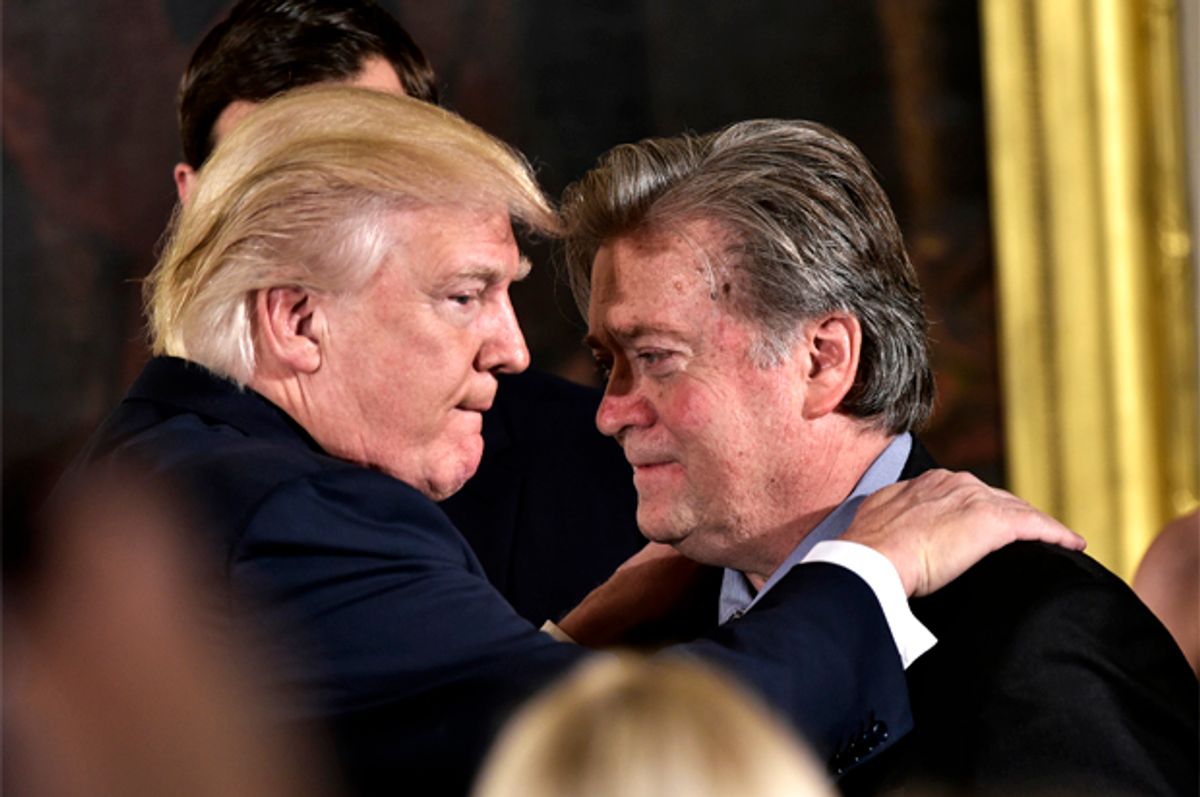It may have been more than merely disturbing that White House chief strategist Steve Bannon overruled a Department of Homeland Security finding about how President Donald Trump's Muslim travel ban would impact green card holders, or that White House chief of staff Reince Priebus asked the FBI to discredit reports about the Trump campaign's alleged contacts with Russian officials. If Harvard doctoral candidate in history Nikolas Bowie is to be believed, it may have also been unconstitutional.
There are three types of executive appointments covered by the Constitution's Appointments Clause, Bowie writes. Principal officers are those who exercise significant authority over departments and agencies and report directly to the president, thereby necessitating Senate confirmation. Inferior officers are appointments who are supervised by the principal officers, with the Senate being allowed to decide whether or not their confirmation should be required. Anyone else is known by the Supreme Court as "employees," which include everyone from postal workers to "assistants to the president" like chief of staff Reince Priebus and chief strategist Steve Bannon. They do not require Senate approval.
"Over the years, these 'assistants to the president' have grown in number and in status to take on some of the most important advisory responsibilities in the White House," writes Bowie. "But even though these assistants now wield tremendous informal clout, they have always remained 'employees' for constitutional purposes. And every president since Roosevelt has generally adhered to the Appointments Clause by restraining their employees from exceeding the constitutional limits on their statutory authority.
"Until now."
Bowie cites several examples of White House "employees" overstepping their authority in unconstitutional ways. This includes the aforementioned examples of Bannon overriding a Homeland Security finding on green-card holders and Priebus trying to instruct the FBI on how to publicly discuss the Russia investigation. Other examples are senior adviser Stephen Miller reportedly telling a U.S. Attorney how to defend Trump's Muslim travel ban and taking charge of a National Security Council meeting and White House counsel Don McGahn telling the Homeland Security Department how to interpret Trump's executive orders.
"I think some of the Trump administration’s employees are exceeding the Appointment Clause’s limit on Congress's grant of authority," Bowie argues. "The purpose of the clause is to ensure that the people who exercise significant authority on behalf of the president are first vetted in full view of the American public. But President Trump’s employees appear to be exercising the same authority informally and without Senate confirmation. At the very least, their requests straddle the line between informal clout and formal command in a way that suggests the Trump administration lacks due regard for the constitutional and statutory limits on its employees’ official duties."
Although Bowie acknowledges that "it’s difficult to distinguish between an employee’s take-it-or-leave-it advice, which the Appointments Clause tolerates, and the sort of direction and supervision that the clause prohibits," he points out that "some of the officers have complied with employees’ directives, as when the Department of Homeland Security stopped letting in green-card holders because of the order by employees Bannon and Miller."
In light of the various other scandals swirling around the Trump administration, it is unclear whether Bowie's observation will gain traction.



Shares